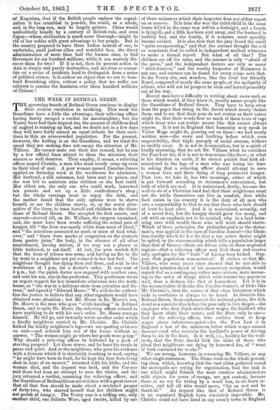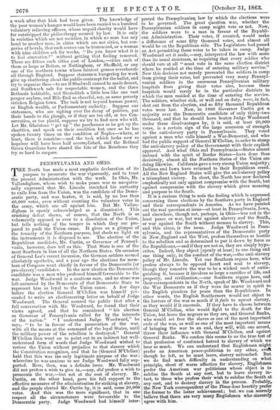THE WEEK IN BETHNAL GREEN.
THE governing boards of Bethnal Green continue to display their zealous emulation in misdoing. This week the Guardians have a little the advantage, their relieving officer having barely escaped a verdict for manslaughter; but the 'Vestry have had their inquest too, the account of children dead of neglect is running up fast, and we doubt not in a few days they will have fairly earned an equal tribute for their exer- tions to thin an overcrowded population. For the present, however, the betting is on the Guardians, and we trust the speed they are making does not escape the attention of Mr. Villiers. He cannot mete out their due reward, but he can by a few official lines attract to them the attention their success so well deserves. They employ, it seems, a relieving officer named Christie, a man who must nearly come up even to their ideal of zeal. A poor woman named Caroline James applied on Saturday week at the workhouse for admission. Her husband, a silk salesman, had been sent to prison, and she was left to maintain nine children as she beat could. Her eldest son, the only one who could work, borrowed ten pounds and set up a little confectioner's shop ; but the whole earnings went- to repay the debt, and the mother found that the only options were to starve herself, or see the children starve, or, as the worst alter- native of the three,- to trust herself and children to the Guar- dians of Bethnal Green. She accepted the first course, and starved—starved till, as Dr. Wallace, the surgeon examined, said, she must have been weeks suffering the actual pain of hunger, till " the liver was nearly white from want of blood," and "the intestines presented no mark or trace of food what- -ever," and "there were marks of congestion on the stomach from gastric juice," the body, in the absence of all other nourishment, having striven, if we may use a phrase so little technical, to eat itself. At last, the poor wretch felt that the hour of release was come, and having no fire to die by went to a neighbour not yet reduced to her last fuel. The neighbour thought her dying then and there, and sent to the workhouse at 1 p.m. for a doctor's order. It was sent at 5 p.m., but the parish doctor was engaged with another case, and sent his son, also in the profession. This gentleman wrote an urgent request for her immediate admission into the work- house, as " she was in a delirious state from privation and dis- tress," and signed it "Edward Moore." We will do the authori- ties the justice to believe that any other signature would have obtained some attention ; but Mr. Moore is Dr. Moore's son, Dr. Moore is the man who goes " stink-hunting " in Bethnal Green, and to spite Dr. Moore the relieving officer refused to have anything to do with his son's order. Dr. Moore must go himself. He did go, and instantly wrote another order which a kindly neighbour carried to Mr. Christie. Mr. Christie kicked the kindly neighbour's legs—we are quoting evidence on oath—and ordered him out of the house without an answer. " The woman might go where her goods were going." Why should a relieving officer be bothered by a pack of starving paupers? Let them starve, and he have his meals in peace and quiet. And so the neighbour, who gave his evidence with a fairness which it is absolutely touching to read, saying ." he might have been in fault, for he kept the door from being shut in hope of an answer," returned with his kicks, and the woman died, and the inquest was held, and the Coroner said there had been no attempt to save the victim, and the jury returned a verdict, censuring the relieving officer, and the Guardians of BethnalGreen are stricken with a great sorrow that all that fuss should be made about a wretched pauper of forty-two, who starved herself that her children might not perish of hunger. The Vestry case is a trifling one, only another child, one Julietta Ware, aged twelve, killed by one of those nuisances which their inspector does not either report on or remove.. Itis she was the third child in the same house killed in the same way within a fortnight, and a fourth is lying ill, and a fifth has been sent away, and the husband is terribly bad, and the family, if it remains, must speedily, become extinct. It is also true that the jury found the smell "quite overpowering," and that the coroner thought the evil so monstrous that he called in independent medical witnesses to make a formal report. But what of all that ? The children are off the rates, and the coroner is only "afraid of the press," and the independent doctors are only so many " stink-hunters," and the worthy Inspector of Nuisances is not one, and excuses can be found for every crime save that. So the Vestry sits, and wonders, like the rival but friendly Board, composed of nearly the same people, at the malignity of editors, who will not let paupers be slain and buried peaceably out of the way.
Decent men have a difficulty in writing about cases such as these which would, if they knew it, greatly amuse people like the Guardians of Bethnal Green. They have to keep away from the paper that rising in the throat which nearly chokes them, and to see that their pens do not stutter as their voices might do, that their words bear no mark of those tears of rage which those who can realize scones like this cannot always repress. It is not in England that humanity may speak as Victor Hugo might do, pouring out on those—we had nearly written men—the scorn and loathing before which even respectability, that triple panoply of social armour, withers so swiftly away. It is not in denunciation, but in a spirit of kindly reasoning, that we ask Mr. Villiers what he considers the Poor Law for, if it is not to stop scenes like these; or what is his function on earth, if he cannot punish that kick ad- ministered to the legs of a man who was losing his time in asking that a relieving officer should attempt to save a woman then and there dying of long protracted hunger. That law, we take it, has two meanings, either of which is put forward according to statesmen's convenience, but both of which are real. It is maintained, firstly, because the well-to-do of a Christian land feel that their neighbours must not die while themselves can live in comfort, that while food exists in the country it is the duty of all mon who owe a responsibility to God to see that those who lack should at least be kept alive. And it is maintained, secondly, out of a secret fear, lest the hungry should grow too many, and ask with an emphasis not to be resisted, why in a land brim- ming over with wealth those who will work should starve. Which of those principles, the philanthropist's or the states- man's, was applied in the case of Caroline James?—the Chris- tian charity which let her die that a too active doctor might be spited, or the statesmanship which tells a population larger than that of Greece—there are fifteen cities in these neglected regions—that a relieving officer may kick them and receive only apologies for the " fault " of having been kicked. Sup- pose that population remonstrated ! It strikes us that Mr. Villiers, who some years since showed that ho was able to look five minutes ahead of his momentary occupation, would regard that as a contingency rather more serious, more menac- ing to the order of things which suits income-tax payers so well, than a distress like that of Lancashire. Yet it is in the accumulation of deaths like Caroline James's, of kicks like Mr. Christie's, that the source of that class bitterness which ends in overturns is always to be found. In districts like Bethnal Green, those outhouses of the national palace, the rich stand as a concrete idea before the poor only in two shapes—the employer who they think stints their wages, the landlord who they know stints their water; and the State only in one— that of the relieving officer, who enables them to keep wages above subsistence-point--for the Poor Law is in England a law of the minimum below which wages cannot descend—and who restrains the landlord's power of driving them to die in the frost. Is it well, i.e., healthy for the well- to-do, that the State should kick the shins of those who plead that neighbours are dying by borrowed fire, of i0 want of food continued for weeks ?"
We are wrong, however, in censuring Mr. Villiers, or any other single statesman. The blame rests on the whole govern- ing class, which, knowing that the vast cities gathered round the metropolis are crying for organization, that the task is one which might furnish the most creative administrators with objects for years of energy, are yet content, because there is no cry for voting by a wood box, to sit down in- active, and tell all who would move, "let us rest and be thankful." An inquest like that of Bethnal Green is in an organized English town absolutely impossible. Mr. Christie could not have lived in any county town in England a week after that kick had been given. The knowledge of the poor woman's hunger would have been carried to a hundred voluntary relieving officers, whose unpaid charity would have far outstripped the philanthropy secured by law. It is only in societies which are not societies, in which no man has any bond to another man, in cities which are not cities, but con- geries of hovels, that such scenes can be transacted, or a woman with nine children ask for weeks, "Do you know what it is to feel starvation ?" without getting that feeling removed. There are fifteen such cities east of London,—cities each of them as large as Bolton, or Nottingham, or Sheffield, or any one of the northern towns whose faintest groans reverberate all through England. Suppose statesmen hungering for work give up chattering about the public contempt for the ballot, and try to organize them—to see if Shadwell cannot be made decent, and Southwark safe for respectable women, and the three Bethnals habitable, and Shoreditch a little less like one vast pauper asylum, and Mile End as cheerful, say, as some poverty stricken Belgian town. The task is not beyond human power, or English wealth, or Parliamentary audacity. Suppose our statesmen, who are sighing over the decay of politics, put their hands to this plough, or if they are too old, or too Con- servative, or too placid, suppose we try to find men who will. Let Mr. Gladstone " get up " the poorhouses as he got up the charities, and speak on their condition but once as he has spoken twenty times on the condition of Naples—where, at least, there is sunshine—and the task which looks now so hopeless will have been half accomplished, and the Bethnal Green Guardians have shared the fate of the Bourbons they try so hard to surpass.































 Previous page
Previous page